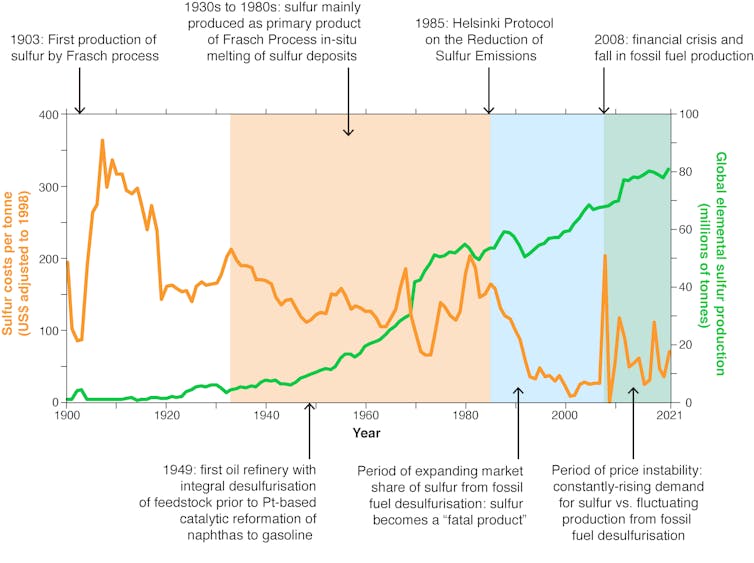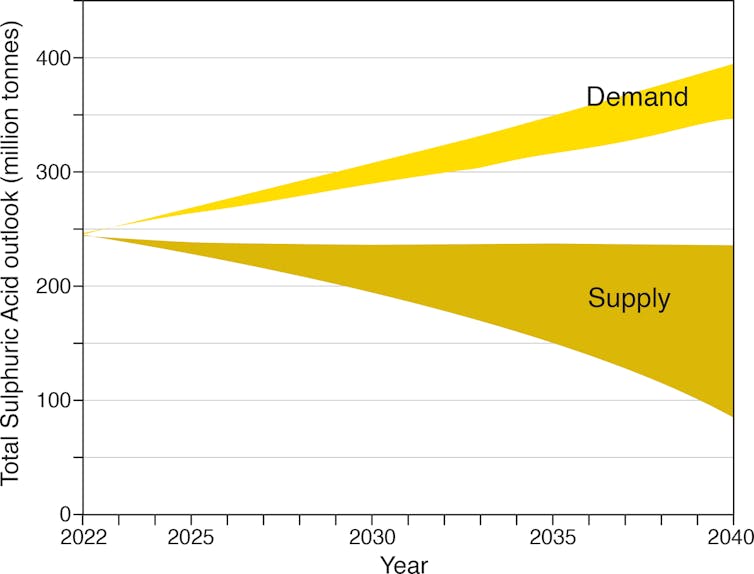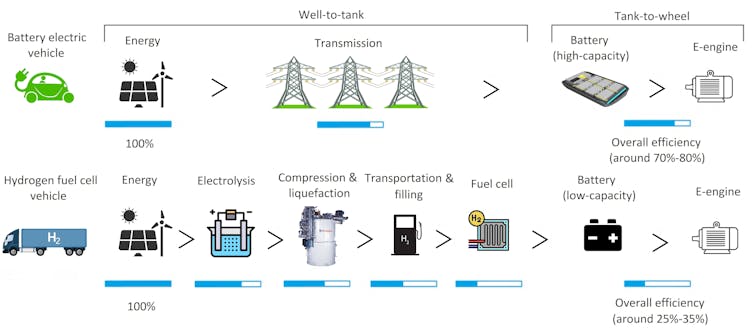With out sulfur within the type of sulfuric acid, industries would battle to supply the phosphorus fertilisers that elevate farm yields or extract the very important metals utilized in the whole lot from sun panels to electrical automobile batteries.
But an issue looms, which has long past in large part not noted. Greater than 80% of the worldwide sulfur provide is a waste product, extracted from fossil fuels like oil and herbal fuel (which in most cases comprise between 1% and three% sulfur via weight) to cut back emissions of sulfur dioxide, the fuel that reasons acid rain.
Getting rid of fossil fuels to rein in local weather exchange will slash the yearly provide of sulfuric acid simply as call for is expanding. The sector already makes use of over 246 million tonnes of sulfuric acid every year. Speedy enlargement within the inexperienced financial system and extensive agriculture may see call for upward push to over 400 million tonnes via 2040.
In step with our newest learn about, a speedy aid in fossil gasoline use required to reach internet 0 emissions via 2050 may create a shortfall of sulfuric acid as massive as 320 million tonnes via 2040, or 130% of provide day manufacturing.
Sulfuric acid costs would upward push, stoking pageant wherein extra successful inexperienced generation industries are prone to outbid fertiliser manufacturers. This is able to building up the price of meals manufacturing and make meals costlier for shoppers, particularly in creating nations the place farmers are least ready to find the money for the upper prices.
An very important business chemical
Sulfur is located in quite a lot of merchandise, together with tyres, sulfur fertiliser, paper, cleaning soap and detergent. However its maximum vital software is in business chemistry, decomposing quite a lot of fabrics.

Maslin et al. (2022), Writer supplied
The impulsively increasing use of low-carbon applied sciences, corresponding to high-performance batteries, lightweight motors for automobiles, and sun panels, will considerably building up mining of mineral deposits, in particular laterite ores which can be more and more vital assets of cobalt and nickel. Cobalt call for may building up via 460%, nickel via 99%, and neodymium via 37% via 2050. All of those are recently extracted the use of massive amounts of sulfuric acid.
On the similar time, projected inhabitants enlargement and nutritional traits can even pressure an building up in call for for sulfuric acid from its unmarried maximum vital shopper: the phosphate fertiliser manufacturing trade.

Maslin et al. (2022), Writer supplied
The US Geological Survey estimates that there’s a virtually infinite provide of sulfate minerals in evaporites (rocks laid down via the herbal evaporation of shallow, salty seas or lakes) and big assets of iron sulfides and elemental sulfur in volcanic deposits, however getting access to those will require increasing mining and mineral processing.
Changing sulfates to sulfur the use of present strategies consumes numerous power and emits numerous carbon. Sulfur mining and sulfide ore processing can pollute the air, soil and water, acidifying floor swimming pools and aquifers and emitting toxins together with arsenic, thallium and mercury. And there are at all times human rights problems related to extensive mining.
Recycle and innovate
Along with discovering new, non-fossil gasoline assets of sulfur, call for for sulfur may well be decreased via recycling and choice business applied sciences that keep away from extensive use of sulfuric acid.
Recycling phosphate from sewage and turning it into fertiliser would cut back the will for sulfuric acid to procedure phosphate rock for fertilisers. This is able to additionally assist to handle considerations that, in the long run, the sector will run out of phosphate rock. It will additionally cut back the quantity of phosphorus coming into freshwater and coastal habitats, which reasons large algal blooms that may suffocate different vegetation and fish.
Recycling extra lithium batteries from electrical automobiles may additionally assist. Growing new batteries and motors that depend much less on uncommon metals would cut back call for for sulfuric acid to extract metals from their ores.
Losing much less renewable power (corresponding to sun and wind) and storing extra of it with out the usage of batteries that want those metals would chop sulfuric acid call for similtaneously it cuts call for for fossil fuels and accelerates decarbonisation. One day, it will also be conceivable to supply massive amounts of sulfur from sulfates via culturing positive micro organism.
By means of expecting long term sulfur shortages, nationwide and global insurance policies can arrange long term call for, building up recycling and expand choice, affordable provides that have minimum environmental and social prices.

Don’t have time to examine local weather exchange up to you’d like?
Get a weekly roundup to your inbox as a substitute. Each Wednesday, The Dialog’s surroundings editor writes Consider, a brief e mail that is going slightly deeper into only one local weather factor. Sign up for the ten,000+ readers who’ve subscribed thus far.
Supply By means of https://theconversation.com/sulfuric-acid-the-next-resource-crisis-that-could-stifle-green-tech-and-threaten-food-security-186765


